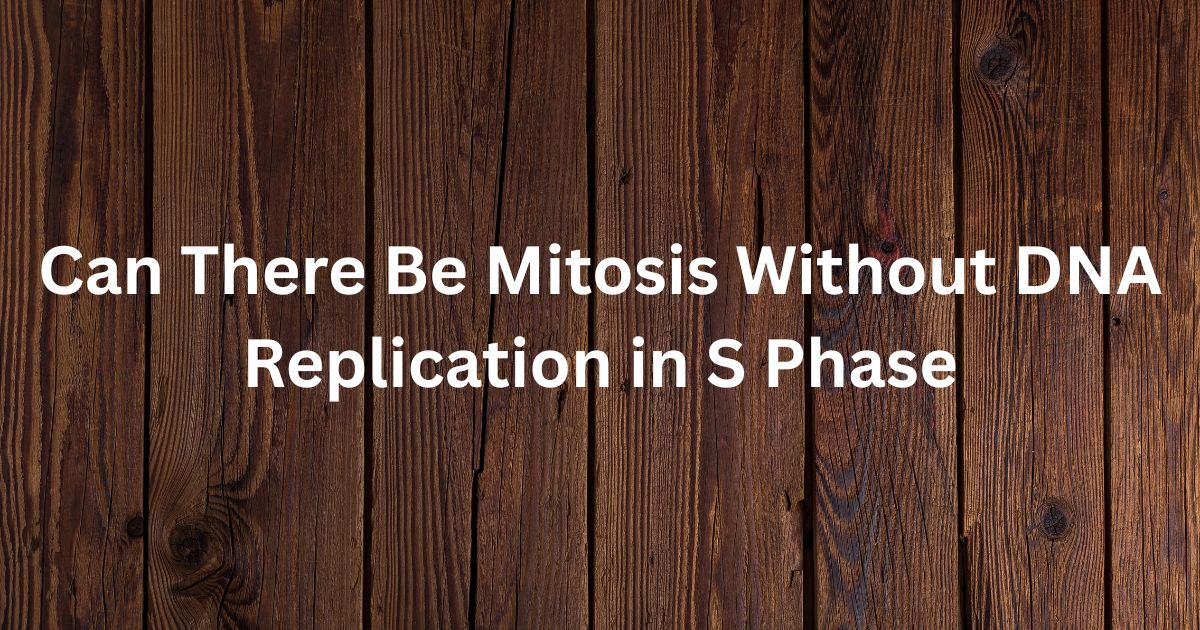Mitosis is a vital process in the life cycle of eukaryotic cells, ensuring that genetic material is equally divided into two daughter cells. One of the key prerequisites for mitosis is DNA replication, which typically occurs during the S (synthesis) phase of the cell cycle. This tightly regulated sequence of events raises an important question in cell biology: Can there be mitosis without DNA replication in S phase?
The straightforward answer is no, under normal physiological conditions, mitosis cannot proceed without prior DNA replication during the S phase. However, this topic opens up interesting scientific discussions, including rare exceptions, experimental manipulations, and implications for cancer research and developmental biology. In this article, we will explore this question from multiple angles, including the biology of the cell cycle, exceptions, experimental evidence, and potential applications.
The Basics of the Cell Cycle
Before we delve into the central question, it’s crucial to understand how the cell cycle works.
Phases of the Cell Cycle
The eukaryotic cell cycle consists of four distinct phases:
- G1 Phase (Gap 1): Cell growth and preparation for DNA replication.
- S Phase (Synthesis): Duplication of the cell’s DNA.
- G2 Phase (Gap 2): Preparation for mitosis.
- M Phase (Mitosis): Division of the nucleus and cytoplasm to form two daughter cells.
These phases are tightly regulated by checkpoints and proteins such as cyclins and cyclin-dependent kinases (CDKs).
The Role of DNA Replication in S Phase
DNA replication is essential for mitosis because it ensures that each daughter cell receives an identical copy of the genome. The S phase marks the period when DNA is duplicated, resulting in two sister chromatids for each chromosome.
Without this step, mitosis would result in daughter cells with incomplete or missing genetic information, which could be lethal or lead to disease.
Can Mitosis Occur Without DNA Replication?
Under Normal Conditions: No
Under standard cellular conditions, mitosis cannot occur without DNA replication. This is because the cell cycle includes checkpoints—particularly the G2/M checkpoint—which prevent the cell from entering mitosis if DNA replication has not been completed.
Why This Matters:
- Prevents genomic instability
- Avoids aneuploidy (abnormal number of chromosomes)
- Maintains the integrity of genetic information
Experimental Evidence and Exceptions
While normal cells do not bypass DNA replication, scientists have explored this concept through experiments. Let’s look at some of these cases.
1. Mitotic Entry Without DNA Replication (Experimental Induction)
In laboratory settings, researchers have manipulated CDK activity to force cells into mitosis without completing DNA replication. For instance:
- Artificial activation of mitotic cyclin-CDKs can push a cell into mitosis even if replication is incomplete.
- This is often used to study checkpoint failures in cancer or to understand mitotic catastrophe, a form of cell death resulting from faulty mitosis.
However, the results are typically catastrophic:
- Chromosomal fragmentation
- Cell death
- Micronuclei formation
- Aneuploid daughter cells
2. Abortive or Partial Replication Events
In some mutant yeast cells or cancer cells, partial replication may occur, and the cell might still enter mitosis. However, this is not normal and usually results in:
- Defective mitotic spindles
- Unaligned chromosomes
- Failed cytokinesis
3. Early Embryonic Cell Cycles
Some early embryonic cells, such as those in Xenopus or Drosophila, undergo rapid cycles with minimal gap phases. But even here, S phase is not skipped—DNA replication still occurs, albeit quickly and in a modified fashion.
Why the S Phase Is a Gatekeeper for Mitosis
There are several molecular checkpoints that prevent mitosis if DNA replication is not complete:
1. ATR/CHK1 Pathway
- Detects replication stress
- Prevents activation of mitotic CDKs
2. Replication Licensing Factors
- Proteins like Cdc6 and MCM complexes ensure DNA is only replicated once.
- If replication is not initiated, these pathways block mitotic entry.
3. Mitotic Entry Complexes
- CDK1 must be fully activated to enter mitosis.
- Incomplete replication causes Wee1 kinase to inhibit CDK1, preventing mitosis.
These systems work together to ensure that genome integrity is preserved.
Implications in Cancer and Disease
1. Checkpoint Failures in Cancer
Cancer cells often bypass cell cycle checkpoints. In some tumors:
- Cells enter mitosis prematurely.
- DNA is under-replicated.
- This leads to genomic instability, a hallmark of cancer.
Understanding how this happens helps in developing targeted therapies that exploit these vulnerabilities.
2. Therapeutic Targeting
Drugs like checkpoint kinase inhibitors (e.g., CHK1 inhibitors) are used in cancer therapy to push cancer cells into mitosis prematurely, resulting in mitotic catastrophe.
This selectively kills cancer cells, as normal cells usually arrest at checkpoints.
Interesting Analogies: Mitosis Without Replication?
Let’s use analogies to clarify why DNA replication is essential:
- Book Copying Analogy: Imagine making two copies of a book to give to two people. If you don’t copy the book first, you end up with only one book for two recipients—one person gets nothing or a torn copy. This is what happens when cells divide without duplicating DNA.
- Shipping Factory: In a factory, orders (DNA) must be duplicated before shipping. If the duplication system (S phase) fails, the orders can’t be fulfilled correctly, leading to product loss or damage (cell death or mutation).
Can S Phase Be Bypassed in Nature?
There’s no known organism where mitosis naturally occurs without an S phase. However, some unusual biological processes exhibit cell divisions that don’t require nuclear division, such as:
- Endoreduplication: Cells replicate DNA multiple times without mitosis, leading to polyploidy (e.g., in plant cells).
- Amitosis: A rare, poorly understood process where some unicellular organisms divide without visible mitosis (e.g., some protozoa).
But in multicellular eukaryotes, particularly animals, S phase is essential before mitosis.
Summary: Can There Be Mitosis Without DNA Replication in S Phase?
| Aspect | Possibility | Outcome |
|---|---|---|
| Normal Cells | No | Checkpoints prevent mitosis |
| Experimental Conditions | Sometimes (Forced Entry) | Leads to cell death or chromosomal damage |
| Early Embryos | No bypass, but modified fast S phase | Still includes replication |
| Disease States (e.g., Cancer) | Sometimes | Causes genomic instability |
| Natural Biology | Rare or absent | No known multicellular organism naturally skips S phase before mitosis |
Final Thoughts
The relationship between DNA replication and mitosis is fundamental to life. The S phase acts as a preparatory step, ensuring that the genetic material is duplicated accurately before it is partitioned during mitosis. Skipping this step is biologically disastrous and generally prevented by multiple fail-safe mechanisms.
While exceptions can be created in labs or may occur in pathological states like cancer, they are not part of the natural cellular process. Therefore, the answer to the question “Can there be mitosis without DNA replication in S phase?” is a scientific no—not under normal, healthy circumstances.
Understanding this intricate dance between the cell cycle phases not only sheds light on basic biology but also helps develop novel strategies for disease treatment and biotechnology.










